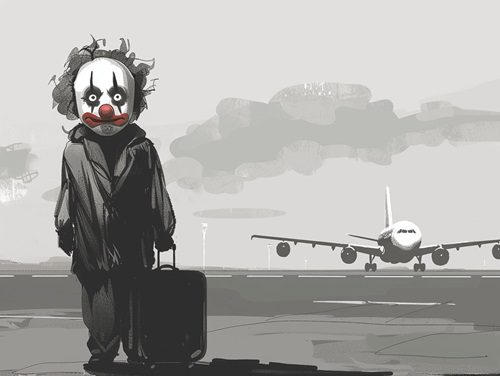 If you think customer service is a joke, you’ve probably been travelling recently.
If you think customer service is a joke, you’ve probably been travelling recently.
I have. I lost my credit card last week while I was on the road. My bank, which promised me a replacement Visa by the next business day, sent an emergency card to the wrong address.
As I write this, I’m on the phone with my financial institution, trying to figure things out. I’ve spoken with dozens of employees, some of whom barely speak English, and we’re no closer to a resolution.
The issue is easy to pinpoint: None of the representatives—at least the ones who understand me—are authorized to own the problem. They can’t make sure they get me a new card; they can only read scripts.
Like I said, it’s a joke.
“I’m frustrated and angry,” says Houry Vitale, an accountant from St. Louis Park, Minn. She recently flew from Minneapolis to Madrid and had what she called a series of “shockingly” bad experiences with her airline, which included unhelpful phone representatives and numerous errors that left her anxious and aggravated.
How bad is customer service in travel?
The situation looks pretty bleak. Last year, the Department of Transportation received a record number of complaints (excluding the pandemic year 2020). We don’t have numbers for 2024 yet, but last year’s customer service scores were nothing to write home about.
Airlines, car rentals and hotels scored 77 out of 100, a C+, on the authoritative American Customer Service Index (ACSI doesn’t rate credit cards, supposedly an indispensable travel tool, but if it did, they’d probably rate even lower.)
“There’s been a shift,” says Mario Matulich, president of Customer Management Practice, a market intelligence firm. “During the pandemic, travel companies were well-staffed and the customer truly came first. Now, prices are higher and there are more customers — and more friction.”
In other words, travel is booming, and companies take their customers for granted, as they always do when times are good.
“The attitude is: ‘Take it or leave it,’” says Adrienne Sasson, a travel advisor from Philadelphia. She says bad customer service is rampant in the travel industry, from apathetic employees to outsourcing call centres to countries where no one understands English.
So what’s going on? And what can you do about it?
Where is the bad service?
Terrible customer service is not universal. Here’s where you’re most likely to encounter it;
Popular destinations. Some destinations are maxed out with visitors and can do whatever they want. “Incredibly popular countries like Italy have more tourists than they know what to do with,” says Rebecca Gade Sawicki, who runs specialty tours. Just after the pandemic, some of the four-star hotels she worked with in Europe would gladly accommodate a guest with dietary needs, such as vegans. “Now,” she says, “it’s hit or miss.” Sawicki expects these lower service levels to continue as long as demand runs high.
Businesses with little or no competition. For example, credit card payment systems, as do airlines in some popular hubs, have little meaningful competition. These businesses are always hotbeds of bad service. When travel starts to pick up, they begin to slack off by outsourcing customer service, with stunningly bad results. My experience with Visa and Vitale’s problems with Delta Air Lines in Minneapolis — where the airline enjoys a commanding presence — are warnings to anyone travelling: Lower your expectations. Delta offered Vitale a partial refund of her ticket and an apology after she complained repeatedly.
Companies that misrepresent their prices. Companies that lie about their product probably don’t care about customer service. Unfortunately, 2024 has brought many new fees and surcharges, some of which are not revealed until you have to pay. “Consumers are not willing to blindly accept fees, whether that’s baggage, cancellation, or service charges that present themselves at the last minute and often without explanation,” says Jen Catto, chief marketing officer at Travelport, a travel technology company. “Gotcha” fees are the very definition of subpar customer service.
This is just a partial list of places where customer service has cratered. The point is that travel companies are ignoring customer service because they can. Now that the pandemic is in the rearview mirror, it’s a seller’s market for travel.
Do you feel betrayed?
Some travellers feel that what’s happening now—the terrible customer service and the soaring fares—is grossly unfair. After all, didn’t we support the airline industry with billions of government aid at the height of the pandemic?
Many travellers are allowed airlines and hotels to give them a travel credit (which they don’t always use) instead of a refund.
Is this any way to say “thank you”?
No, it is not. Some of us learned this lesson after 9/11, to some extent during the Great Recession, and now in the aftermath of the pandemic. You shouldn’t expect a business to do anything but maximize shareholder value. It will not repay your loyalty with kindness or better customer service. Just ask Vitale, the passenger on that flight to Madrid. She achieved Platinum Medallion status for the first time this year. She says it did her no good.
What to do about bad service
Experts tell me that customer service will not improve anytime soon, but you can manage it.
Question your loyalties
This is a great time to take inventory of the last four years. What did you do during the pandemic to support your travel business, credit card, and airline? How loyal has your airline been to you? This might be the right time to switch to a different airline — or credit card.
Improvise
If you’re worried about the fees, you may need to get creative. Frequent traveller Jodi RR Smith says her favourite hotel recently became super strict with late checkout fees ($100 for missing her noon checkout). So she discovered a workaround—she negotiated with her housekeepers to clean her room last, which allowed her to stay in the room longer and avoid paying the fee. “I gave them a generous tip,” says Smith, an etiquette expert.
Vote with your feet
The best way to express your disapproval of ridiculous fees, carelessly outsourced call centres, and outrageously high prices is to stop doing business with a company and tell a friend. It may be the only way to reverse this unfortunate trend.
Matulich, the customer service consultant, says consumers have the power to do that. They can double down on a company that offers great service and stop doing business with one that has failed. He’s personally shifted some of his business to hotels like IHG, Marriott, and Hilton, which have invested in customer-facing technology and away from properties that don’t seem to care.
“If you don’t take care of your customers,” he adds. “They will leave you.”
If enough customers vote for their business, companies will finally understand that Bad service is not profitable in the long run.
Written by: Christopher Elliott
BIO:
Christopher Elliott is an author, consumer advocate, and journalist. He founded Elliott Advocacy, a nonprofit organization that helps solve consumer problems. He publishes Elliott Confidential, a travel newsletter, and the Elliott Report, a news site about customer service. If you need help with a consumer problem, you can reach him here or email him at chris@elliott.org.




















